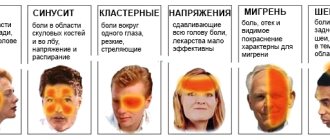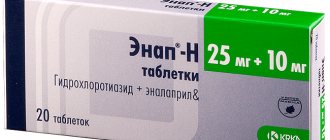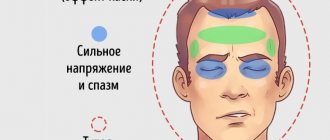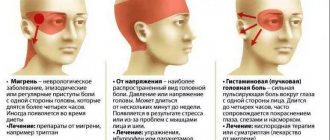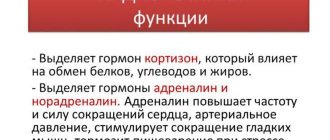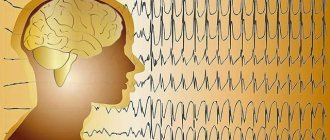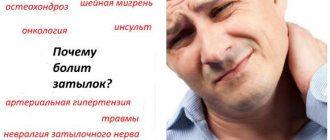Headaches that do not depend on physical, external influences most often occur during working age and are classified as tension headaches. Soreness can bother a person for varying durations - from several minutes to days, with periods of decreasing and exacerbating discomfort. Tension headaches are divided into episodic and chronic. The first form of the disease is established if attacks occur less than 15 times a month with a total duration of up to 180 days a year. Chronic tension pain is said to occur when attacks last more than 15 days a month; this form is characterized by greater intensity of symptoms. Subdivision and determination of the nature of tension-type headache is necessary for the correct prescription of treatment.
What is a tension headache?
If there is a sudden attack of pain in the head, which also quickly passes or calms down after drinking a cup of tea or eating a chocolate bar, then we are talking about a tension headache. What it is? These are squeezing, tense or dull unpleasant sensations in the head area. The phenomenon is noted for its short duration and is often associated with everyday stress.
When a person is psychologically tense, then he experiences similar pains in the head. If they become constant or prolonged, then a person becomes depressed or anxious. To some extent, we are talking about a psychosomatic disorder, when the psyche affects the state of physical health.
The syndrome in question is preceded by physical causes:
- Incorrect posture.
- Neck muscle tension.
All this leads to tension in the muscles, which contributes to low blood flow to the brain. This triggers migraines. For everyone, such pain is characterized differently: sometimes dull, sometimes tightening, sometimes unilateral, sometimes bilateral. In this case, the following emotional states are always noted:
- Appetite and sleep disturbances.
- Fatigue.
- High sensitivity to bright light.
- Nervousness.
- Sensitivity to loud sounds.
The pain is not severe, but pressing and squeezing, which distinguishes this type of headache from others.
Relieve headaches without drugs
So is it possible to cope with the problem on your own and how to relieve a headache without medications? Of course it is possible, and even necessary. But after examination by a doctor.
Self-massage movements of the head and neck to eliminate headaches
If it is known for sure that pain is not a symptom of a serious disease, then you can begin to use various methods that help relieve pain or have a preventive effect and reduce the likelihood of its occurrence.
Self-massage
Self-massage has a very good effect in treating headaches. It can be carried out at any time and anywhere.
- You need to start massaging from the forehead, gradually moving towards the temples. Here you should linger a little and make 6-8 circular movements.
- After this, you need to work on the points behind the ears. You need to press them vigorously several times.
- Then it is advisable to stretch your neck muscles.
Despite the fact that this massage is very effective, it is strictly contraindicated for some types of headaches.
There are many answers to the question of how to relieve a headache. You can choose any method that is effective in each specific case. But to avoid the danger of causing even more harm, you should first consult a doctor.
Tension headache symptoms
Many people may notice symptoms of tension headaches, especially during the off-season or after a hard day:
- The first symptoms are mild or moderate pain, which does not particularly bother the person, so he gets used to it and continues to do his daily activities.
- The pain is as follows: monotonous to squeezing, as if in a vice, constricting, dull, bilateral, as in a helmet or hoop, diffuse, squeezing.
- Transition of pain from the forehead to the back of the head.
- The duration of pain is from 30 minutes to a day, even more, depending on individual characteristics.
- The pain is constant and not throbbing.
- The pain does not provoke vomiting or nausea. However, it leads to other symptoms:
- Nervousness.
- Intolerance to loud sounds and bright lights.
- Appetite and sleep disturbances.
- Increased fatigue.
- Fatigue.
- Irritability.
- Weakness.
It is indicated that women most often suffer from tension headaches. However, both men aged 25-45 years and children often experience similar symptoms. When diagnosing health, one should take into account age and the causes of the syndrome.
Medicines to treat other headaches.
Basic indications, contraindications and other information for the patient.
Features: all drugs in this group can reduce headaches, toothaches, and have an antipyretic effect. There are substances that enhance the effect of analgesics, so these drugs often have a complex composition.
The most common side effects: allergic reactions, nausea, abdominal pain, erosions and ulcers of the gastrointestinal mucosa.
Main contraindications: individual intolerance, exacerbation of gastric and duodenal ulcers.
Causes of tension headaches
All causes of tension headaches can be divided into psychological and physiological. Which of them are more common depends on the individual’s lifestyle. According to statistics, psychological and physiological causes occur with equal frequency.
Physiological reasons include tension in the muscles and ligaments of the neck and head. This factor arises as a result of a person occupying an uncomfortable position. For example, working at a computer for a long time, lifting weights, sitting behind the wheel, etc. Staying in one position all the time, a person inevitably pinches nerves and muscles, which leads to poor blood circulation. You should also pay attention to your body position while sleeping.
Psychological reasons include:
- Stress.
- Emotional stress.
- Chronic stress.
- Increased anxiety.
Many people are not in open, but in hidden depression, when they themselves deny their own condition or simply do not notice it. This factor also provokes a number of symptoms that accompany headaches.
The development of the disease is promoted by:
- Insufficient functioning of the antinociceptive system.
- Tonic muscle spasm.
- Violation of the central mechanism in reducing the pain threshold.
- A biochemical shift that leads to vascular spasms and increases pain.
- Lack of serotonergic systems.
- Depression.
Medications and breathing disorders can also cause TTH.
Causes of headaches
Tension headaches have the following causes:
- Long-term stressful situations that affect the mental state.
- Lack of a sleep pattern, in which pain can occur both from a lack of sleep and from its excess.
- Taking medications for a long time.
- Muscle strain that occurs as a result of keeping the head and neck in one position for a long time.
Muscle strain especially applies to such professions as:
- drivers;
- seamstresses;
- computer operators.
Staying in one position for a long time leads to the fact that the muscles do not receive proper relaxation, causing pain and discomfort.
Tension headaches can be aggravated by climatic phenomena (sudden changes in pressure and weather changes), as well as disturbances in sleep and eating patterns. Lack of physical activity also puts a person at risk for developing TTH.
The disease is most severe in cases where several of the above factors are combined. Treatment of tension headaches caused by several factors requires not only taking medications, but also eliminating aggressive precursor factors (reducing stress, normalizing nutrition, sleep and rest patterns, normalized physical activity).
Tension headache is considered one of the most common forms of this symptom. In 80% of cases, pain does not pose a threat to human health. Read more about the symptoms of tension headaches, as well as diagnosis, causes and treatment.
In what cases you should take Citramon for headaches, you will find out in this topic.
Headache and nausea - what causes these symptoms? By following this link https://neuro-logia.ru/zabolevaniya/migren/golovnaya-bol-i-toshnota-chto-eto.html you will learn what serious diagnoses cause similar symptoms and how the patient should act in such a situation.
Chronic tension headache
Chronic tension headaches are often the result of long-term use of analgesics and tranquilizers. Neurons of increased excitability appear in the brain, which have a low inhibitory mechanism. If other factors are added to the causes of headache, then the chronic form intensifies. These factors are:
- Physical fatigue.
- Emotional stress.
- Change of weather.
- Work in a stuffy room.
- Starvation.
- Poor posture.
- Night work.
- Mental fatigue.
- Drinking alcohol.
To some extent, a person can influence the prevention of chronic tension headaches. This is due to his psycho-emotional state. Otherwise, all the work is left to the body, which can independently produce “painkillers” substances. However, if the mechanism of their production is disrupted, the syndrome intensifies.
Headache from a runny nose
A common cause of headaches is inflammation of the paranasal sinuses, so common that they are sometimes suspected of it, even when they are innocent.
How can you recognize a genuine sinusitis headache?
- It usually begins during or after severe hypothermia;
- There is a deep nasopharyngeal runny nose;
- It is localized in one place of the face or head and plays out very quickly;
- The pain is worse in the morning because the mucus has not had a chance to drain completely;
- It worsens with coughing, sneezing and sudden movements of the head;
- Sinusitis pain is aggravated by alcohol, sudden temperature changes and, in winter, when moving from a warm room to a cold one.
Diagnosis of tension headaches
Only after consulting a doctor can you begin to diagnose tension headaches. First, the doctor differentiates the syndrome by its nature:
- Episodic headaches are symptoms that last from 30 minutes to 7 days for 2 weeks per month. The frequency of such symptoms is up to 6 months per year.
- Chronic headaches are symptoms that last more than 2 weeks, more than a month or even six months.
- Episodic pain is characterized by less intensity, which is accompanied by anxiety disorders as a result of visual and motor tension.
- The chronic form is characterized by incessant, monotonous and prolonged pain, which provokes demonstrative personality changes, depression, paranoid changes, and reduces activity in society.
Tension headaches are not paroxysmal, throbbing, and do not cause nausea or vomiting.
Diagnosis is carried out by external examination of the patient, observing muscle soreness and increased sensitivity. Neurological symptoms and brain damage are also excluded. The following analyzes are carried out:
- CT and MRI of the cervical spine.
- Electroencephalography.
- Radiography.
- Dopplerography.
- Blood analysis.
Treatment of tension headaches
The most important area of treatment for tension headaches is to eliminate the causes of their occurrence. Eliminating the causes will lead to irreversible recovery. In addition, other treatment methods are used.
Mild headaches can be eliminated without medication. First of all, a person must look at his life. Does he have time to rest? How often does he relax? If you constantly work and do not rest, then headaches are natural.
Other ways to resolve the problem may be:
- You should take breaks if your work requires constant sitting.
- Eat properly. If you are inactive, you should avoid alcohol, fatty foods and coffee.
- Get a good night's sleep. The duration of sleep should be at least 6-8 hours.
- Play sports and be active.
If these measures do not help, then you can resort to medications:
- Aspirin.
- Paracetamol.
- Ibuprofen, etc.
Severe tension headaches can only be treated by a doctor. He individually selects a list of medications that will help solve the problem. It often consists of antidepressants and drugs aimed at eliminating the causes of pain.
The course of treatment lasts 2-3 months. During this time, it is not recommended to use anti-inflammatory and painkillers as the symptoms will return over time.
Massage of the scalp and collar area is actively used. You can do it yourself, but for greater effect a massage from a professional is suitable. This procedure is performed to relieve spasms, improve blood flow, and relax muscles.
Among the medications often prescribed are:
- Muscle relaxants (Sirdalud, Mydocalm).
- B vitamins.
- Antidepressants.
- Magnesium preparations.
- Nootropics.
- Non-steroidal anti-inflammatory drugs.
- Analgesics.
Physiotherapy procedures are prescribed:
- Acupressure.
- Acupuncture.
- Postisometric relaxation.
The dosage and course of treatment are strictly controlled by the doctor so that the headache symptoms do not intensify.
Preventing tension headaches
Tension headaches are the result of a person’s improper daily routine. We are talking about either monotonous work, which requires a static body position, which leads to muscle tension, or a lack of rest, which involves relaxation, mental and mental calm. This will prevent headaches.
First of all, you should change your work schedule:
- Or choose other opening hours.
- Or make work less stressful.
- Or delegate some of your responsibilities, etc.
You should work, but not at the expense of your own health. You should also rest daily. It's about both physical and emotional relaxation. If there are no such conditions at home, then they should be created or the situation should be changed.
Vacations should be organized when you can completely take a break from everyday activities. They should be combined with physical activity, sports and walks in the fresh air. All this allows you to relieve the tension that provokes unpleasant headaches in the future.
Bottom line
You should take care of your health. Doctors cannot do anything if the person himself does not contact them. The outcome of self-treatment can be either positive or negative, which depends on the effectiveness of the measures chosen.
The prognosis for the treatment of tension headaches is favorable. If a person pays attention to the symptoms in the early stages and uses the proposed recommendations, then he will be able to eliminate the unpleasant syndrome. Otherwise, the disease will intensify, becoming chronic.
Tension headaches themselves do not affect a person’s life expectancy, but they worsen its quality, making the individual less active, functional and intellectually capable. Much depends on the causes of pain. If they are not physiological, then they are not fatal.
When is it necessary to contact a specialist?
People usually take tension headaches for granted. However, if the headaches are intense or occur several times a week, then you need to consult a specialist.
Your doctor will ask questions about your headache, family history, diet, and lifestyle to help diagnose the type of headache you have.
You should urgently seek specialist advice if your headache:
- appeared suddenly and is different from what you experienced before;
- accompanied by severe neck tension, high fever, nausea, vomiting and fainting;
- occurred after an accident, especially after a head injury;
- accompanied by weakness, numbness, slurred speech, or fainting.
Read also….
Neck Pain These symptoms suggest that the problem requires immediate treatment.

